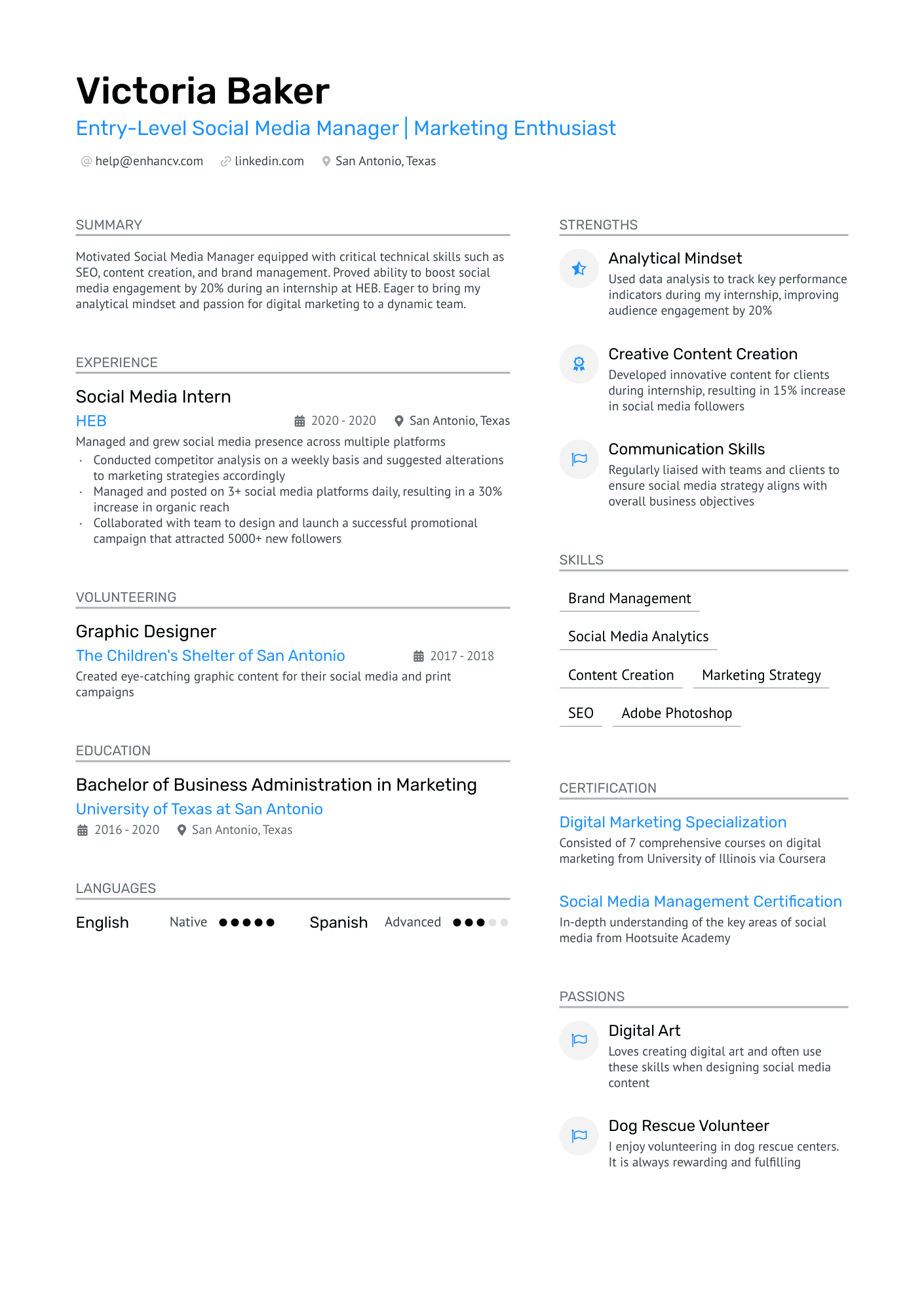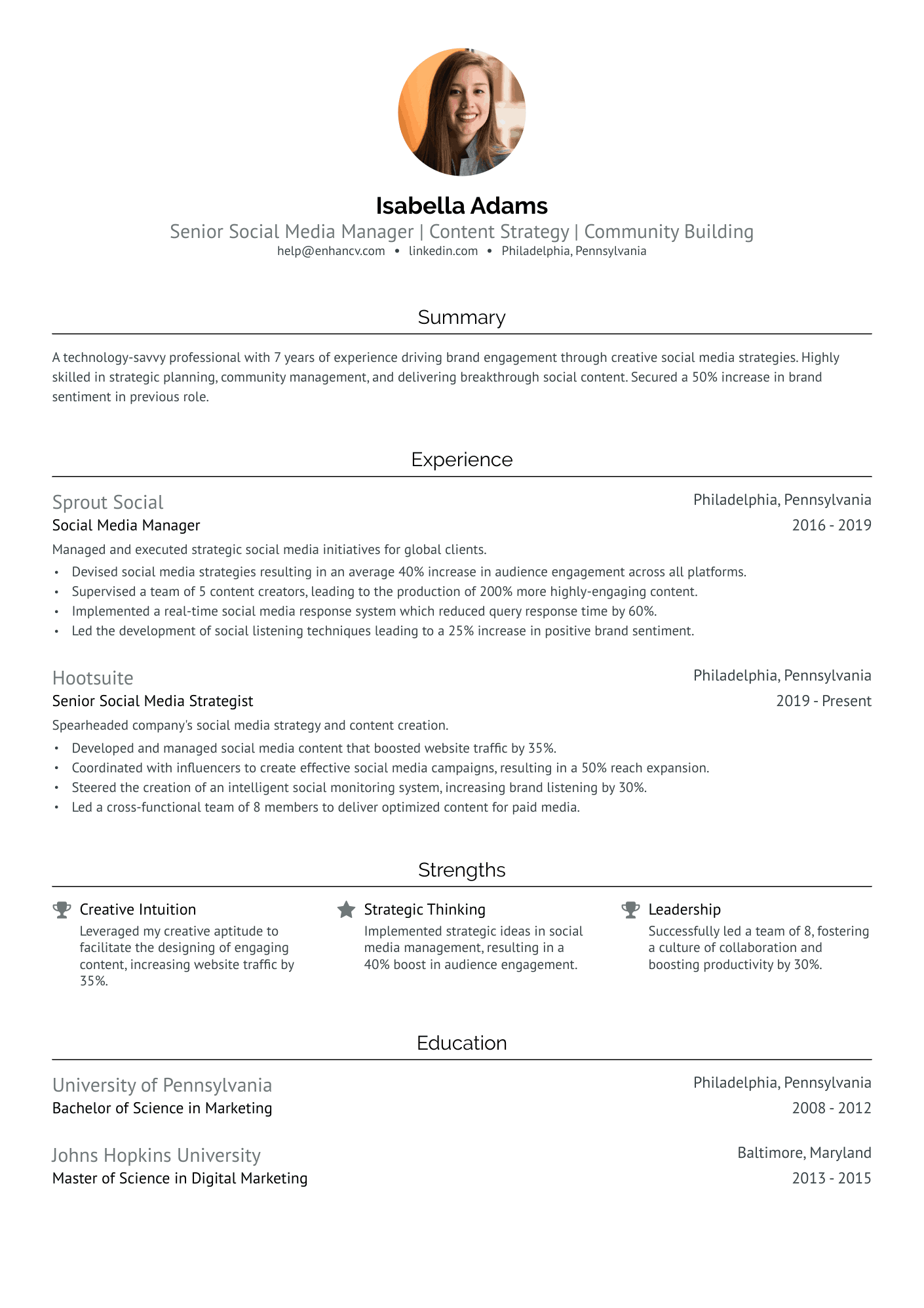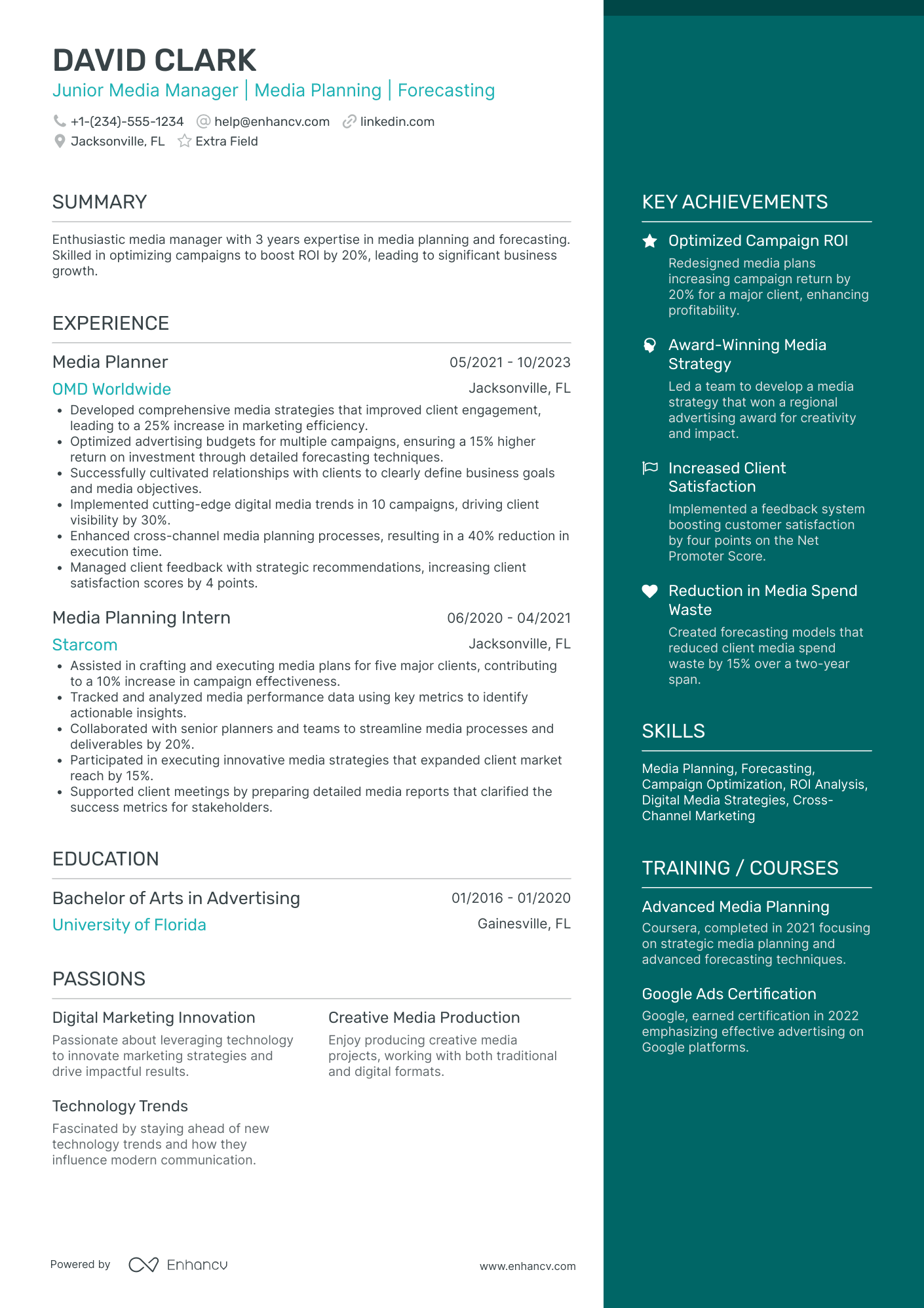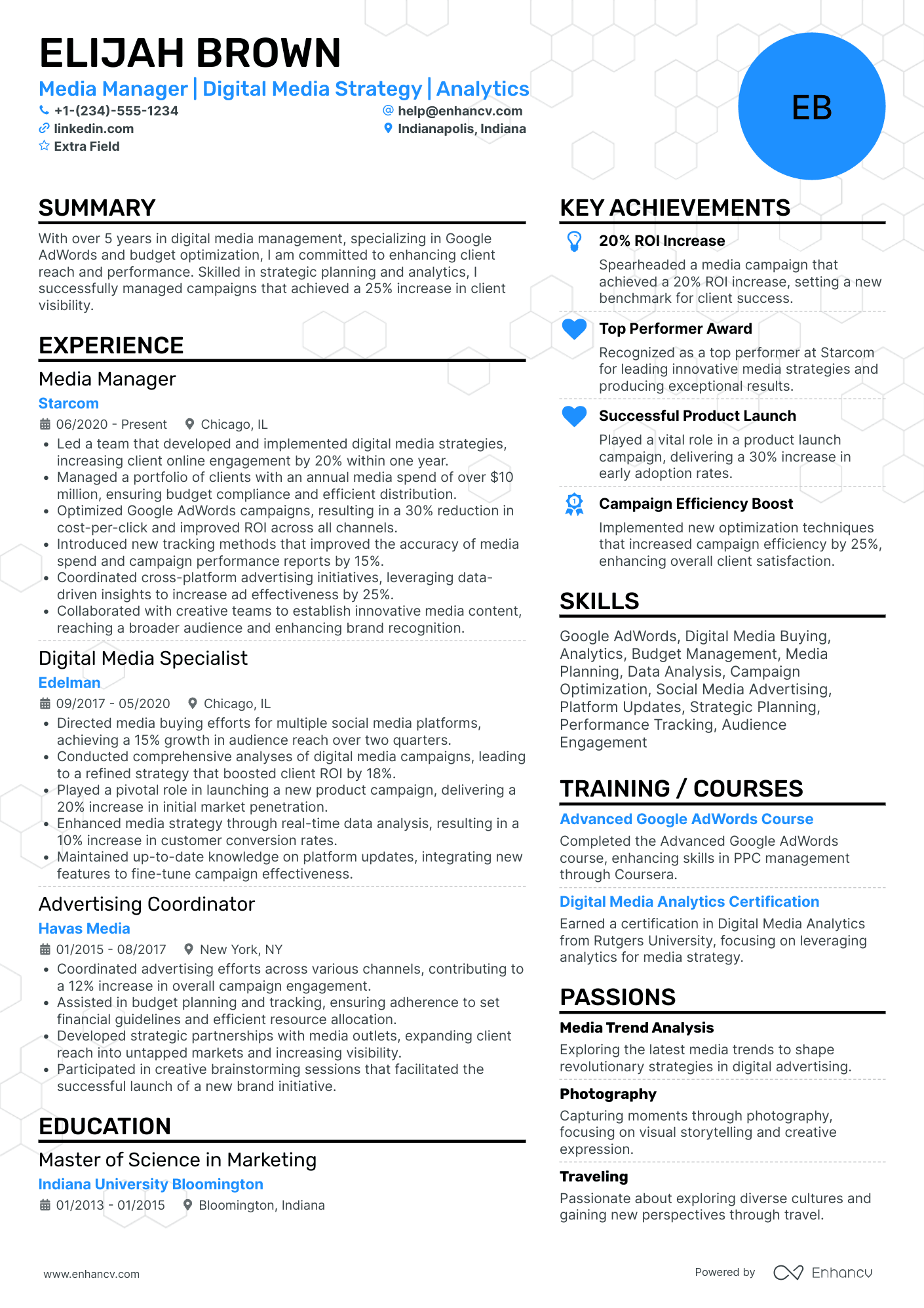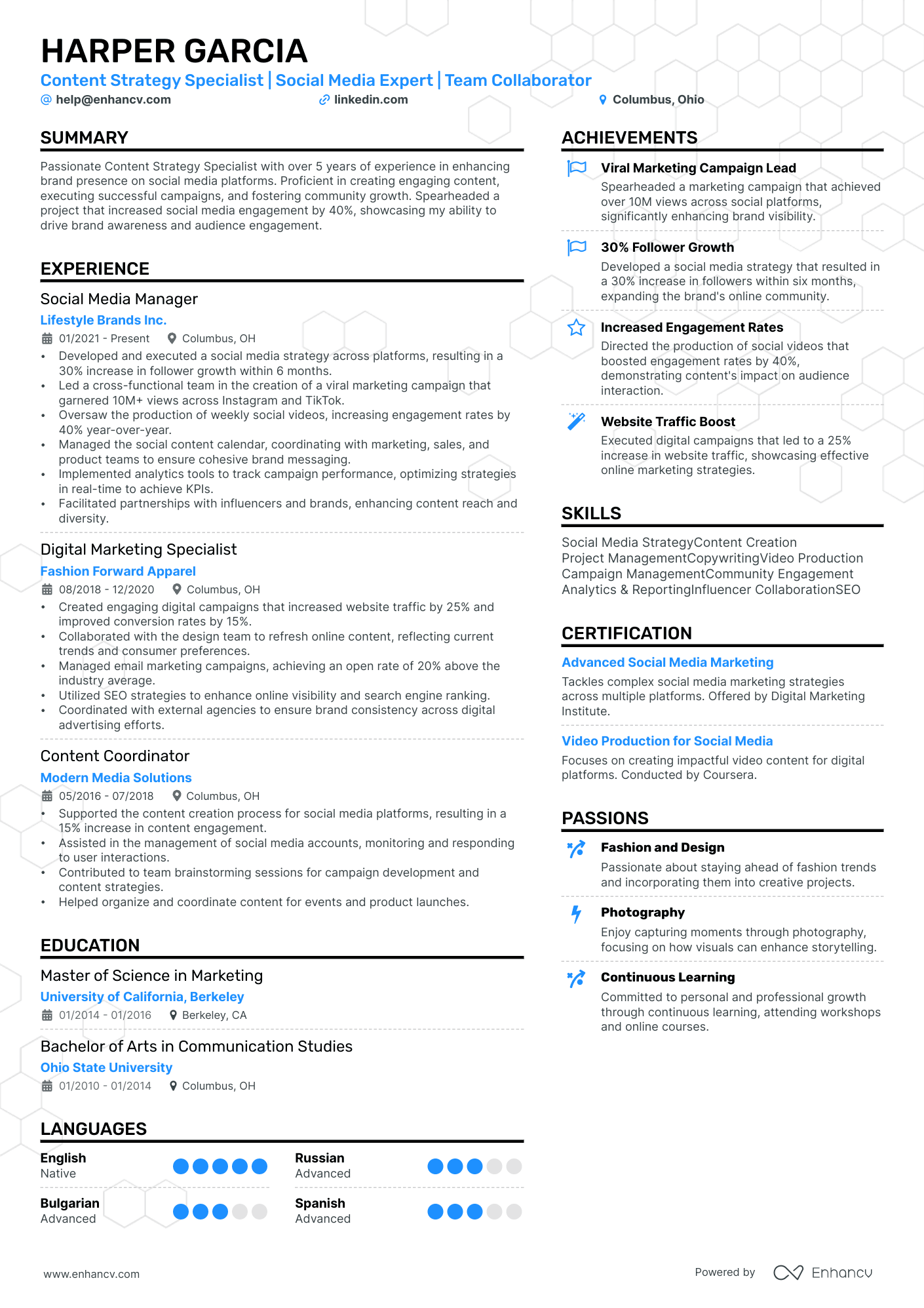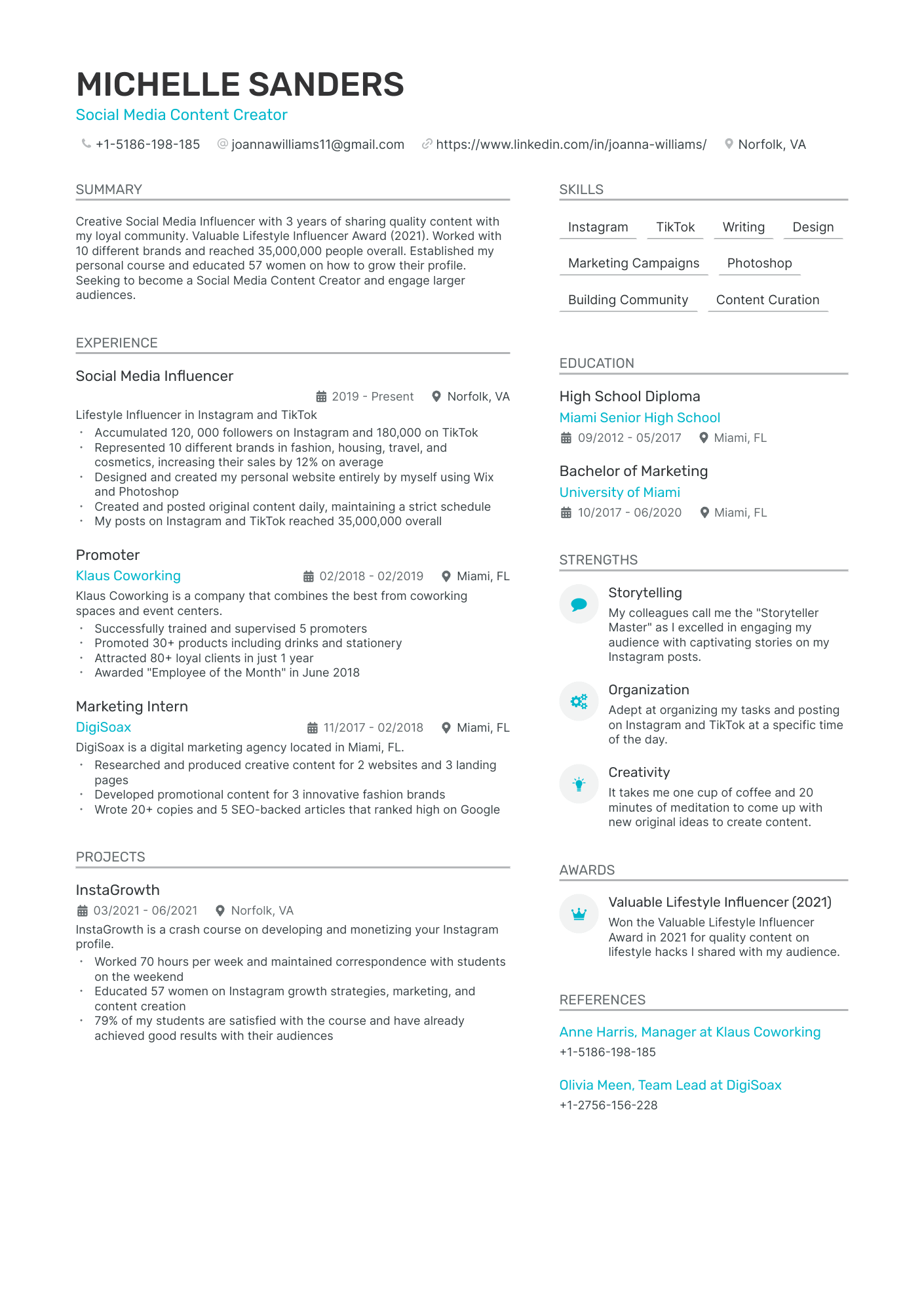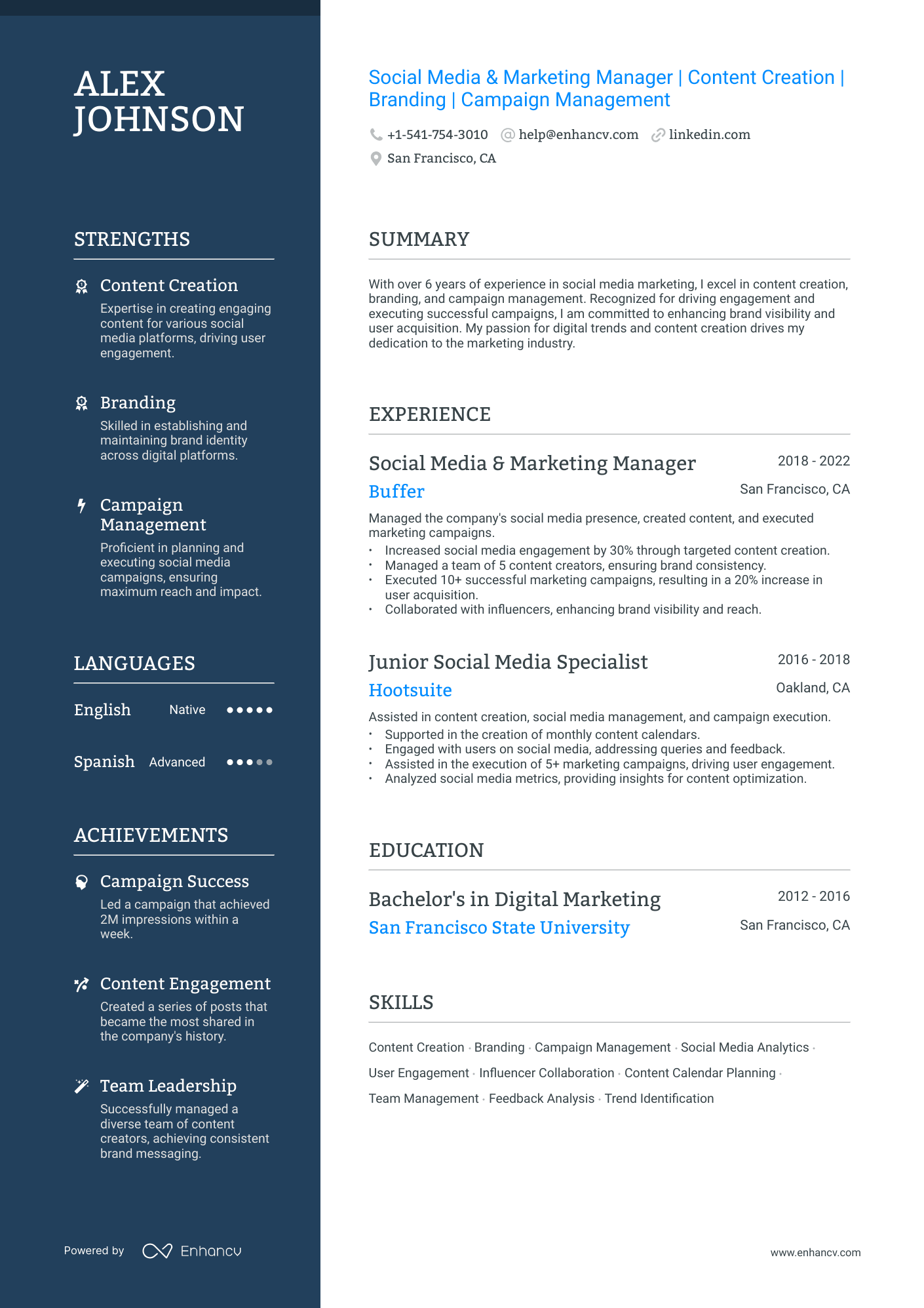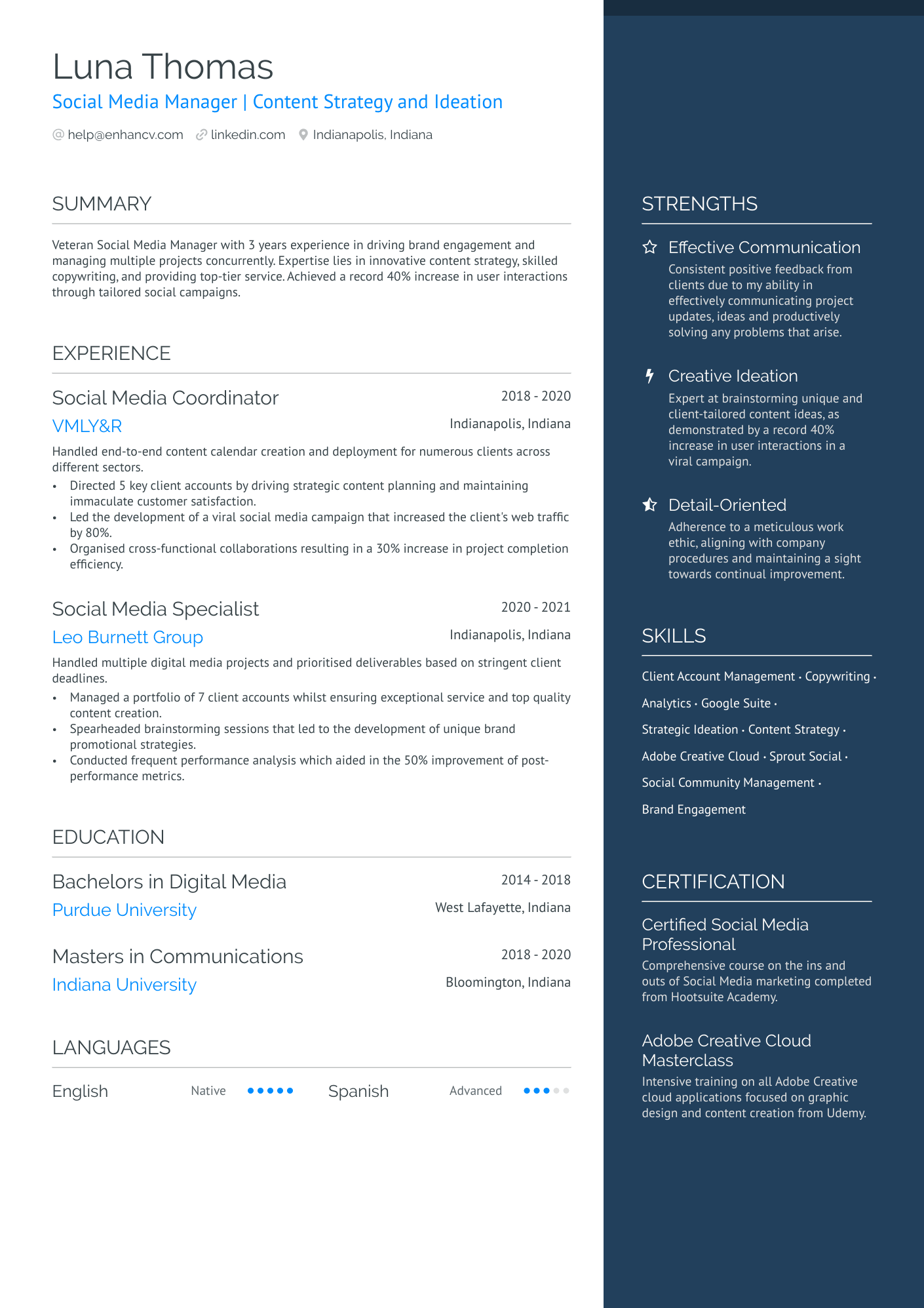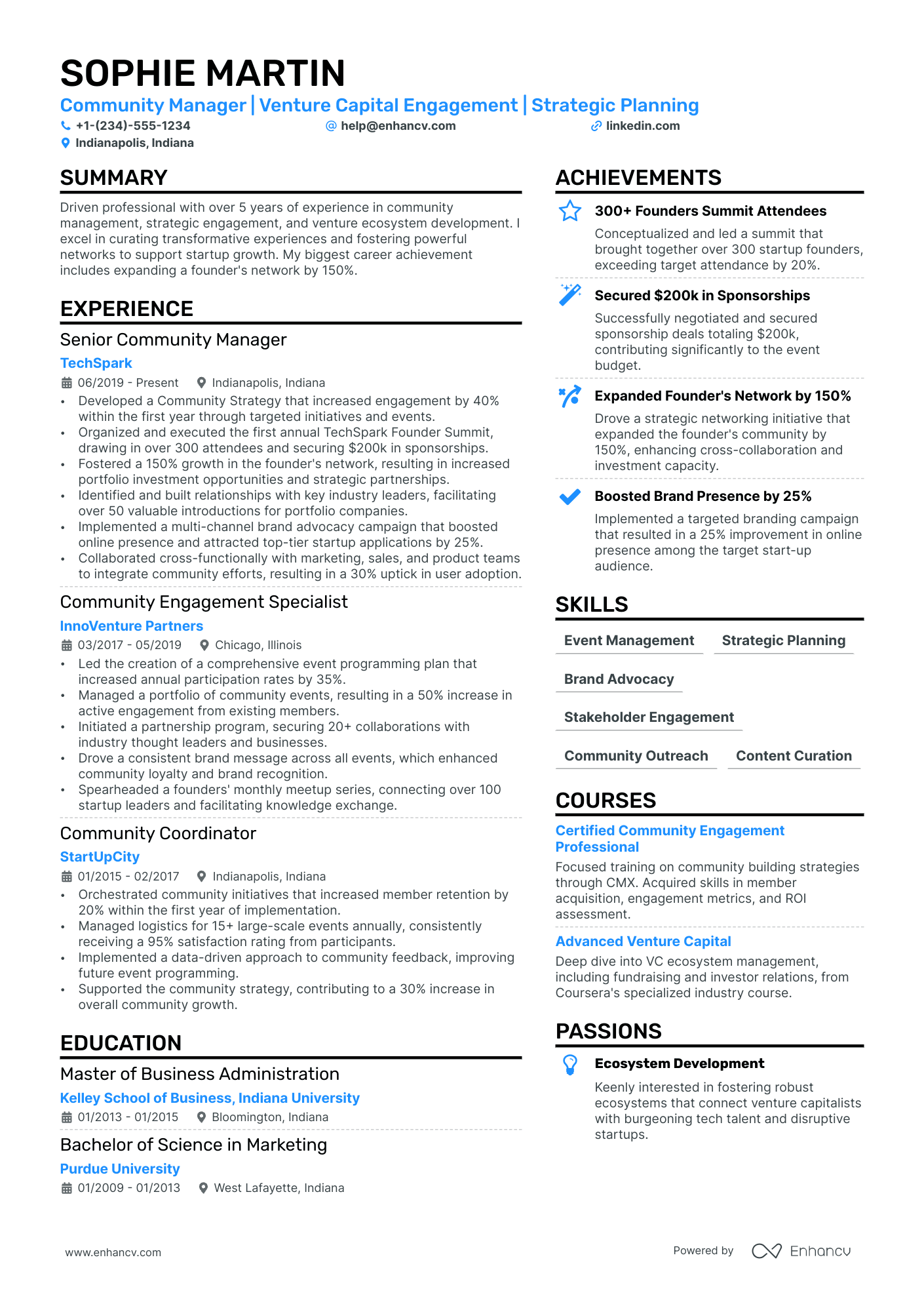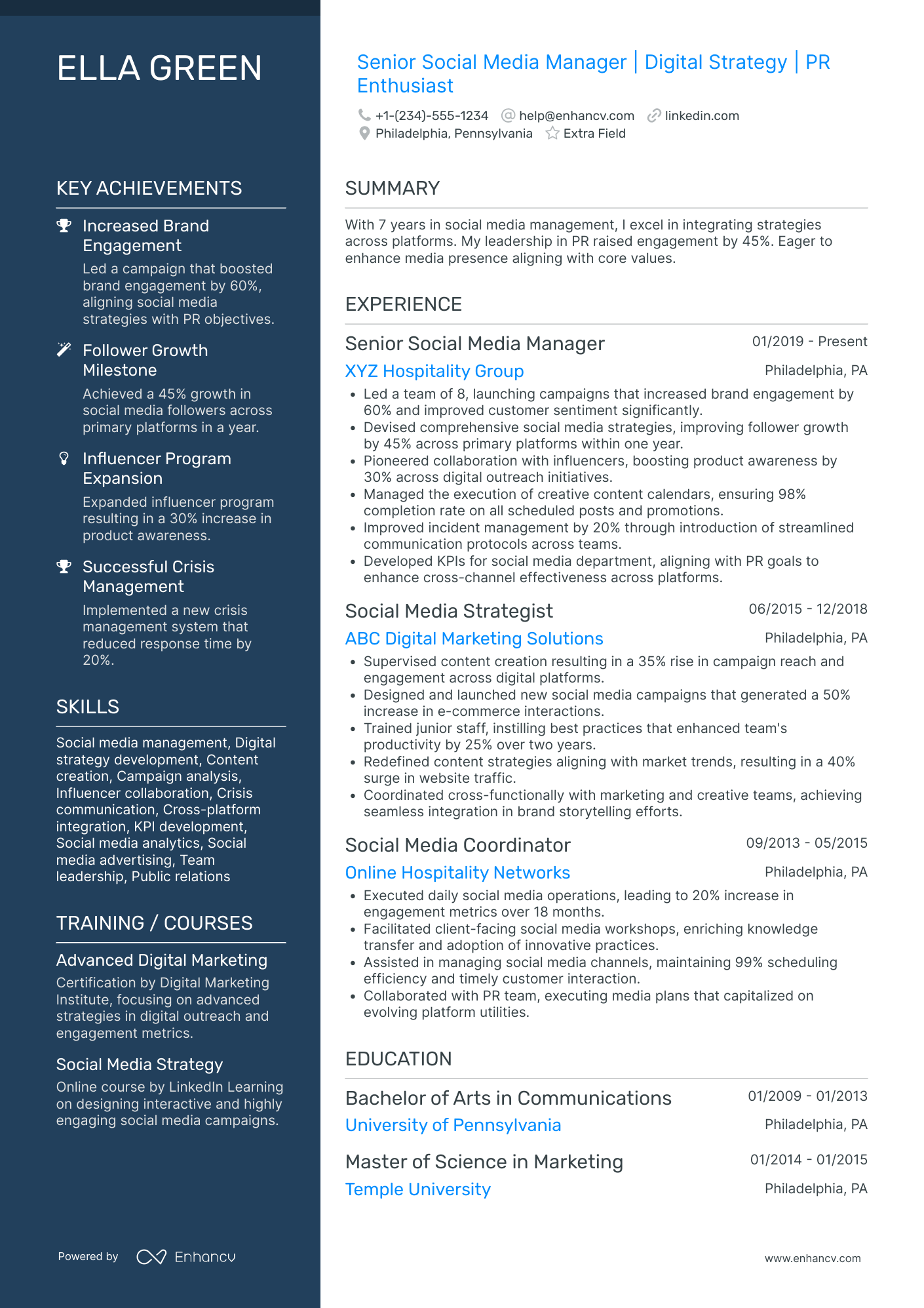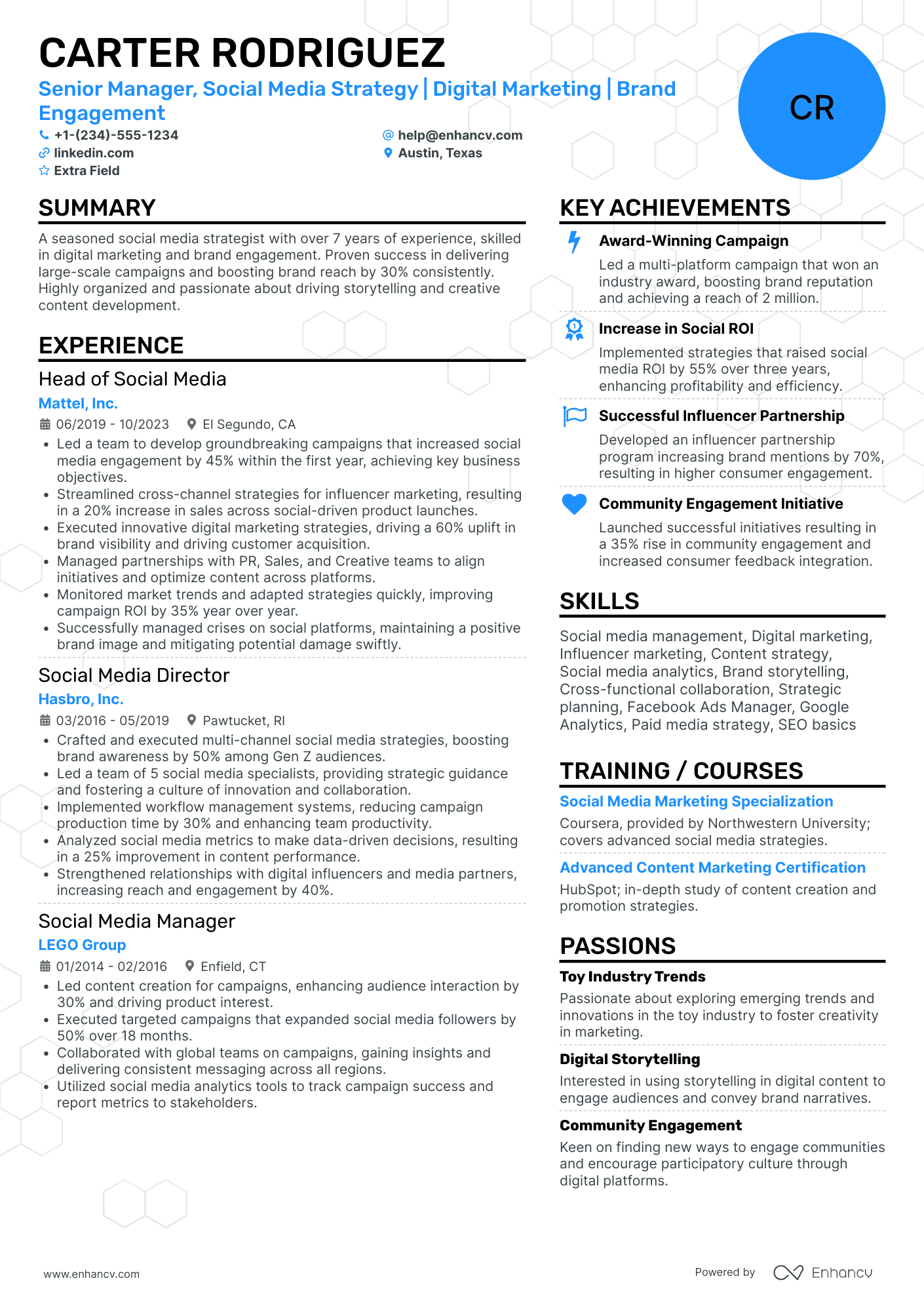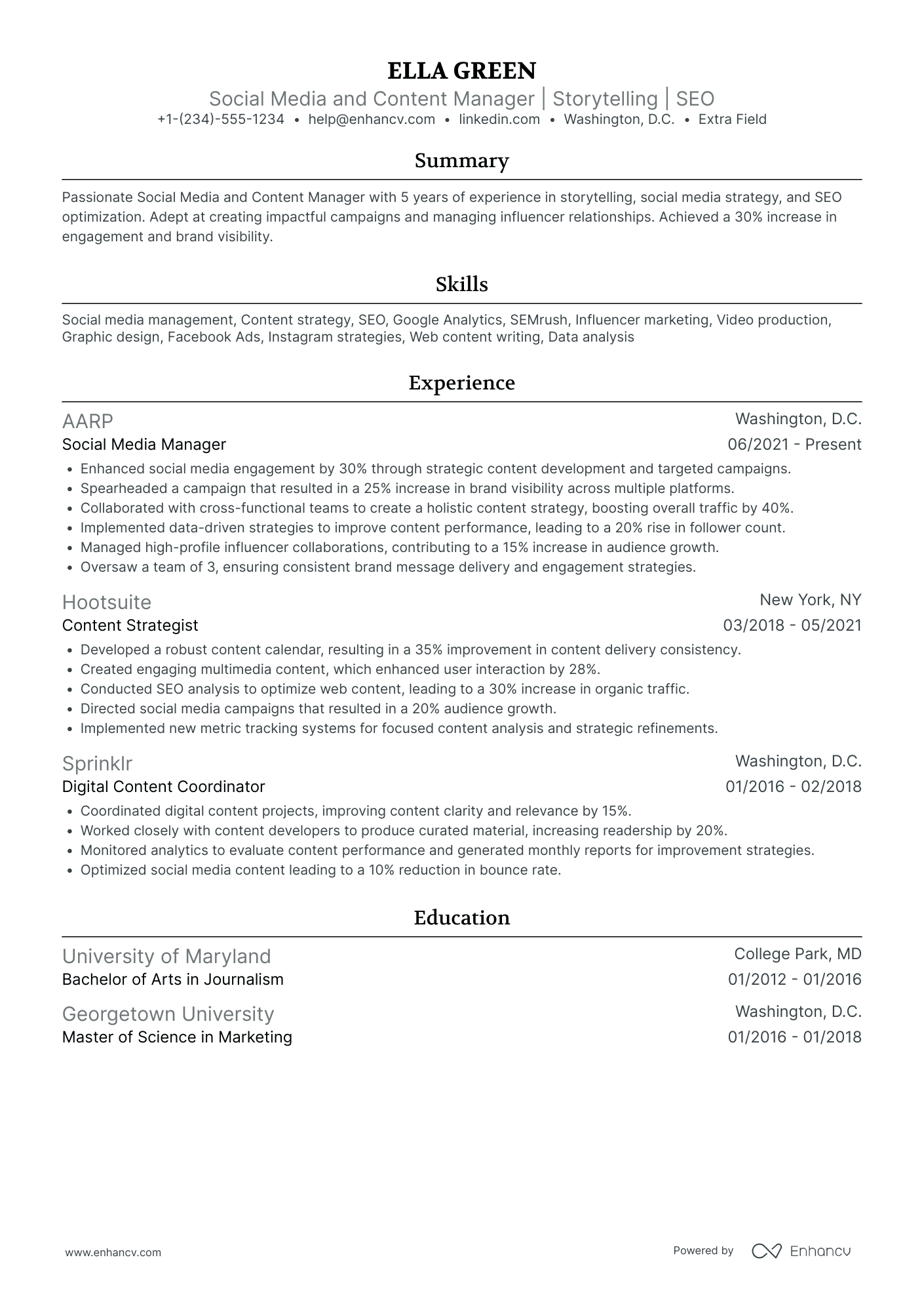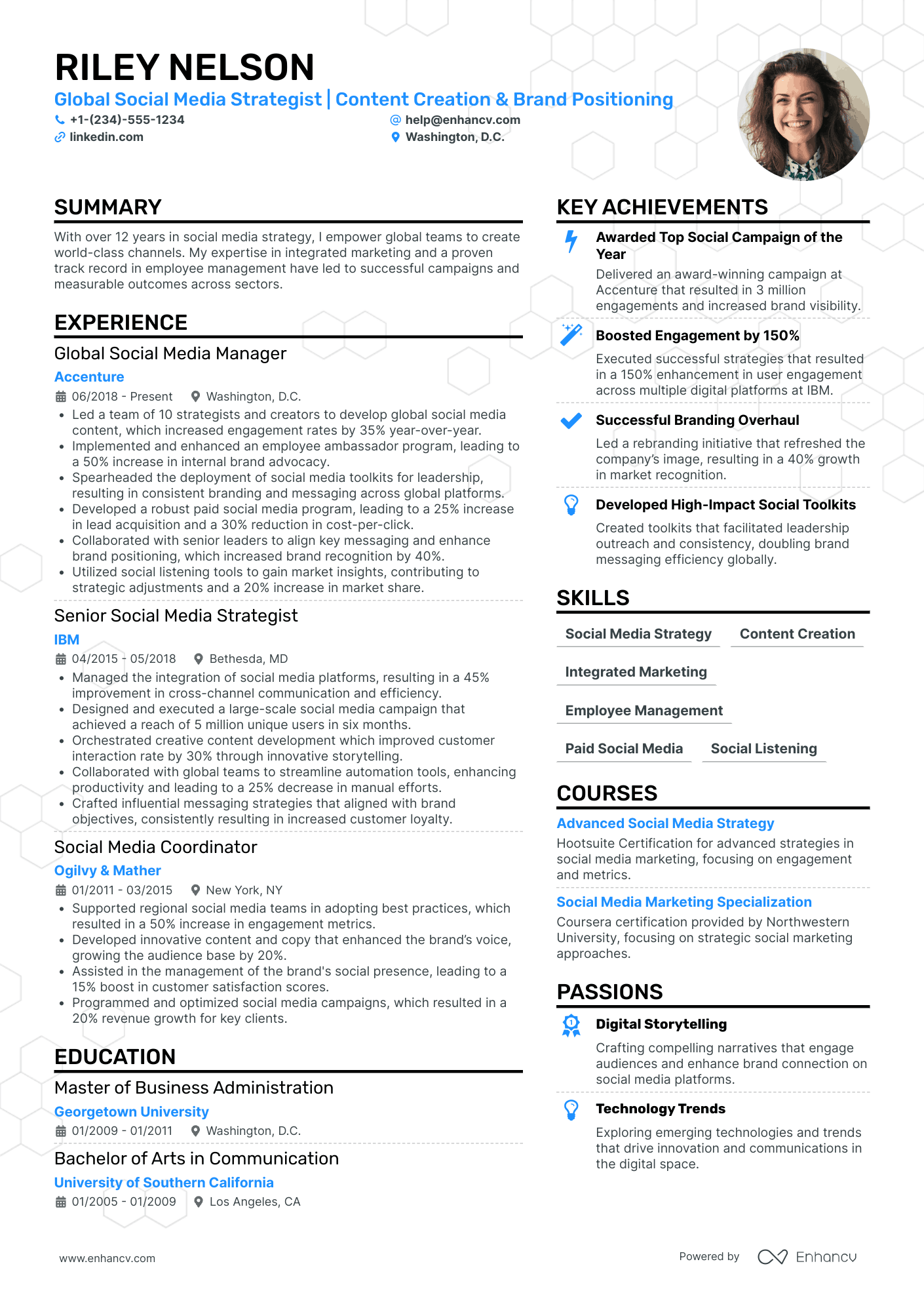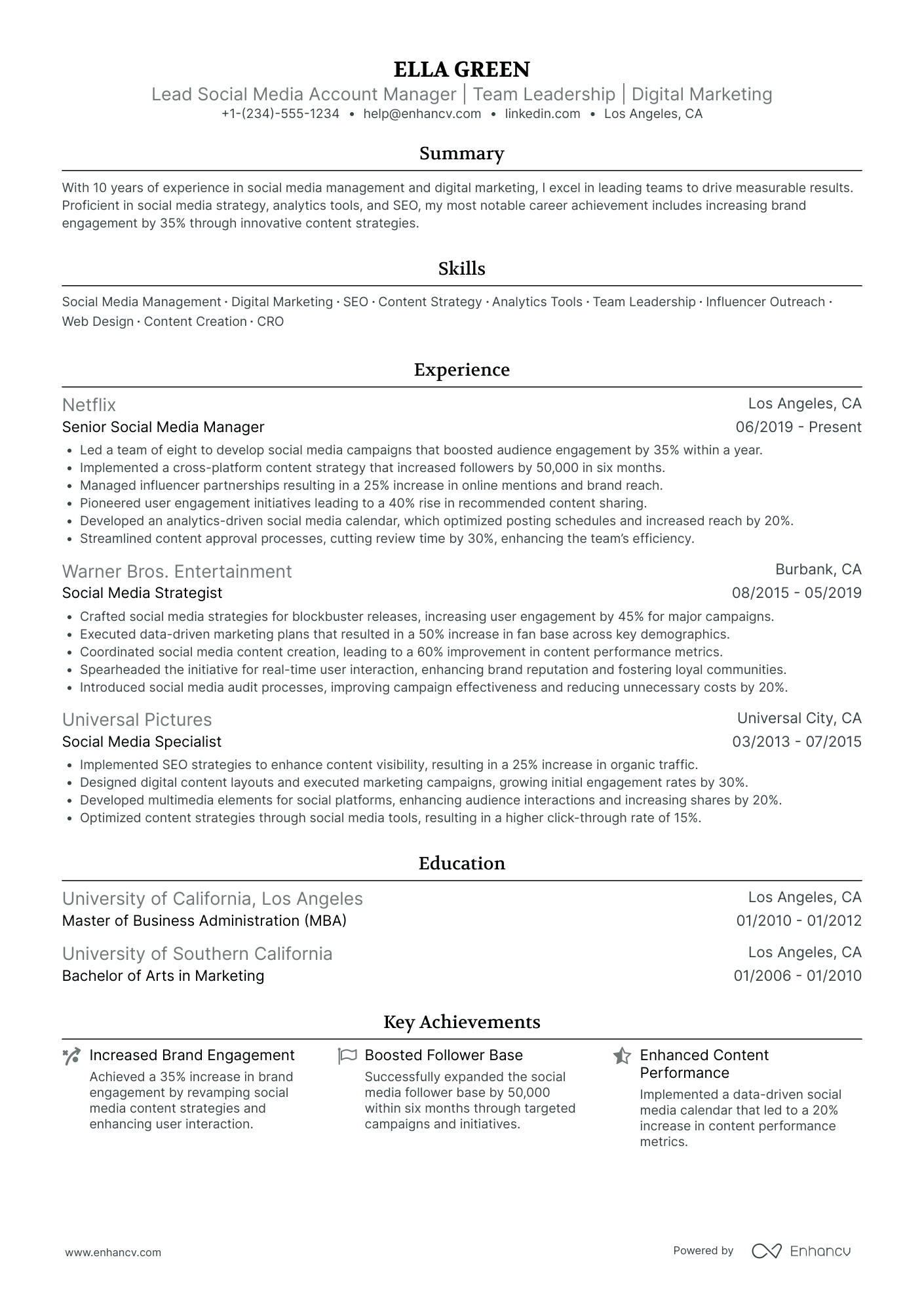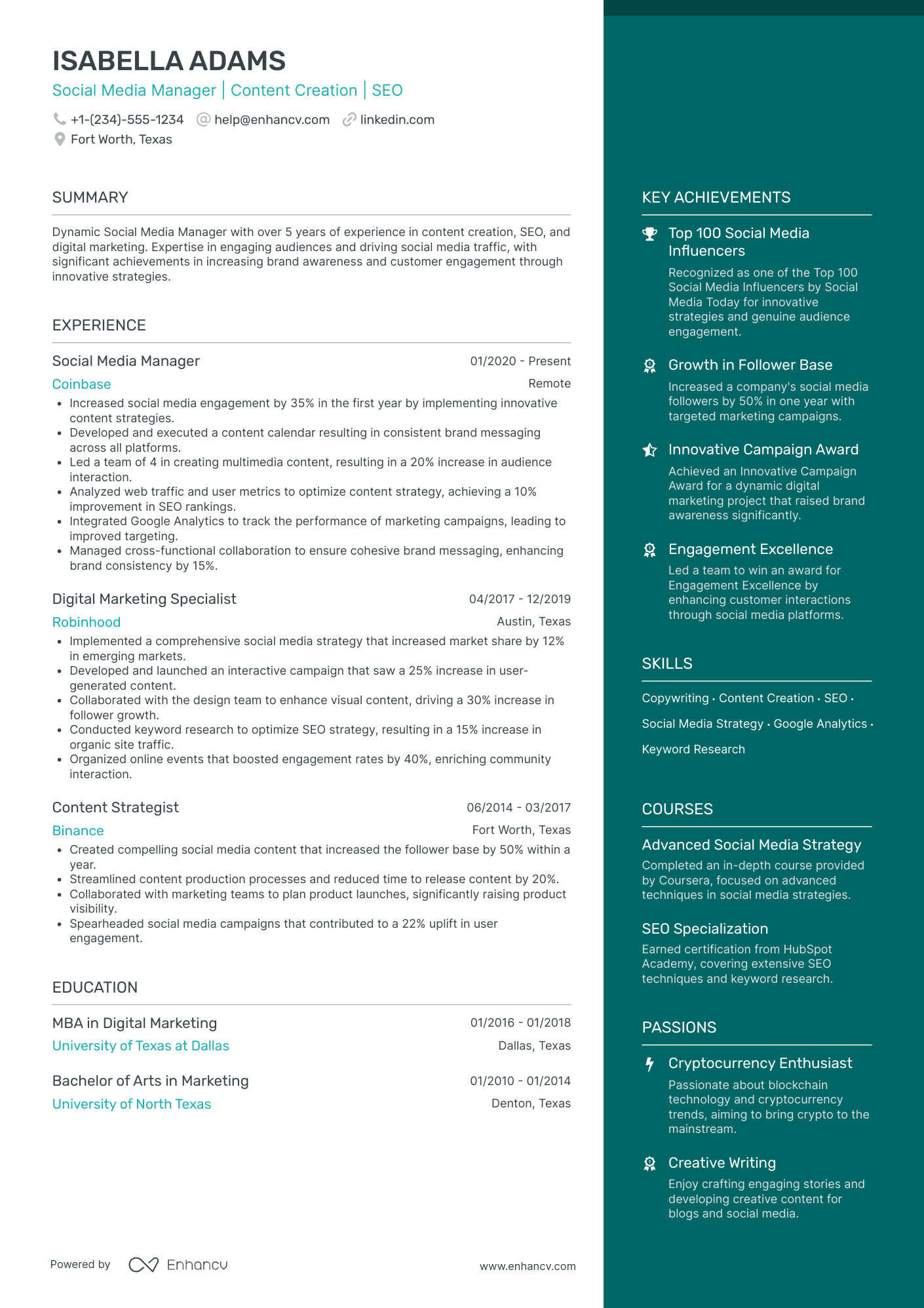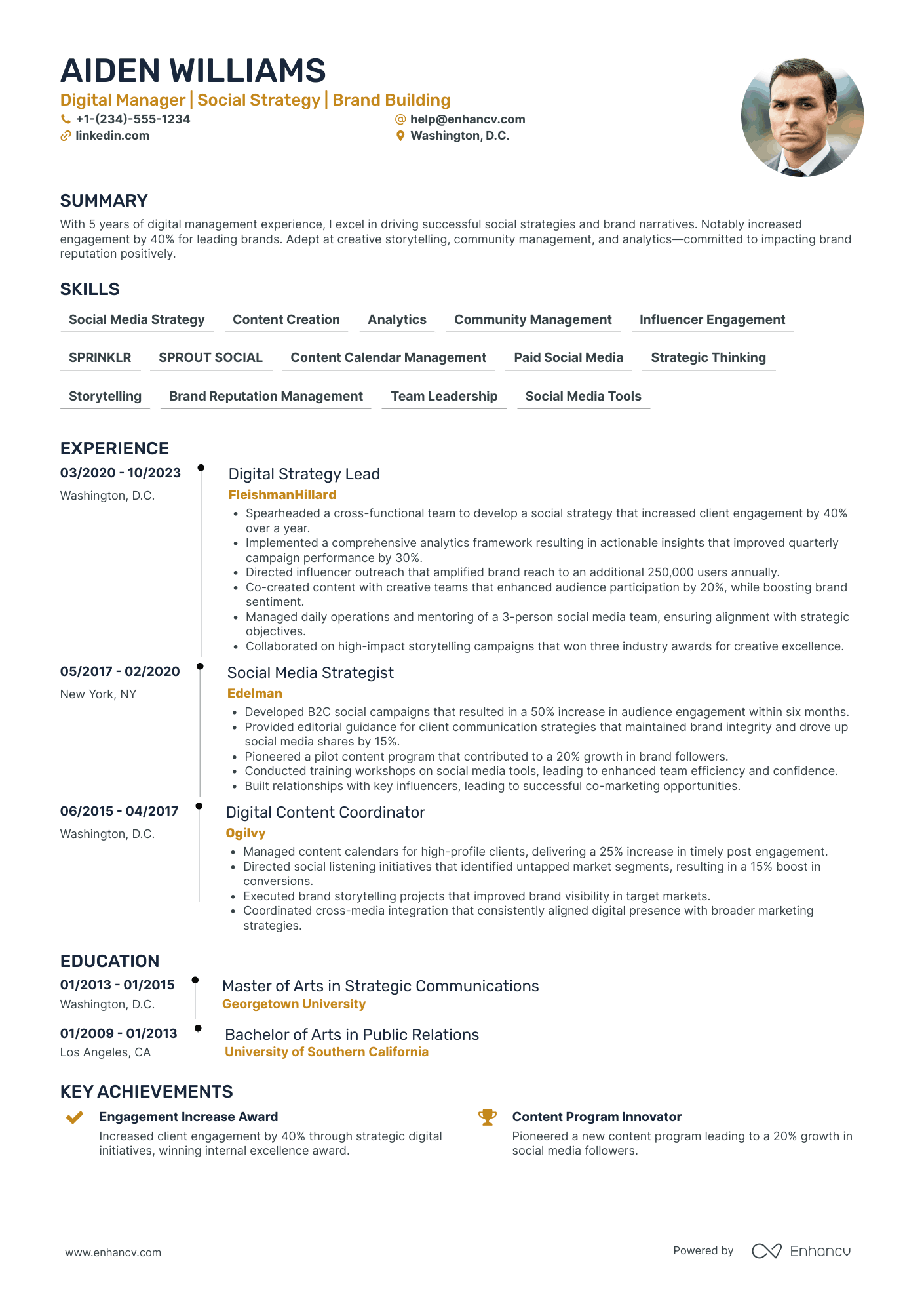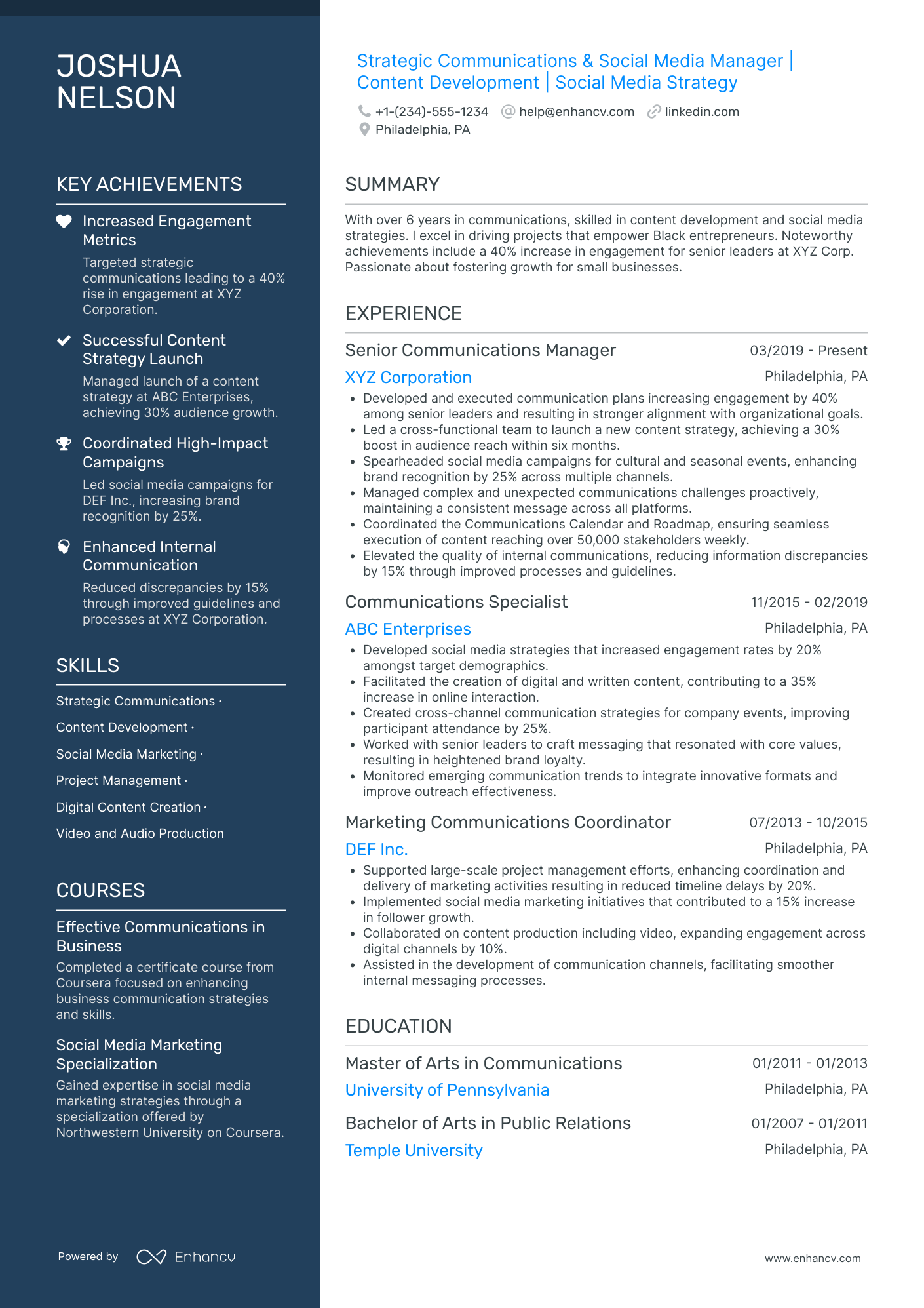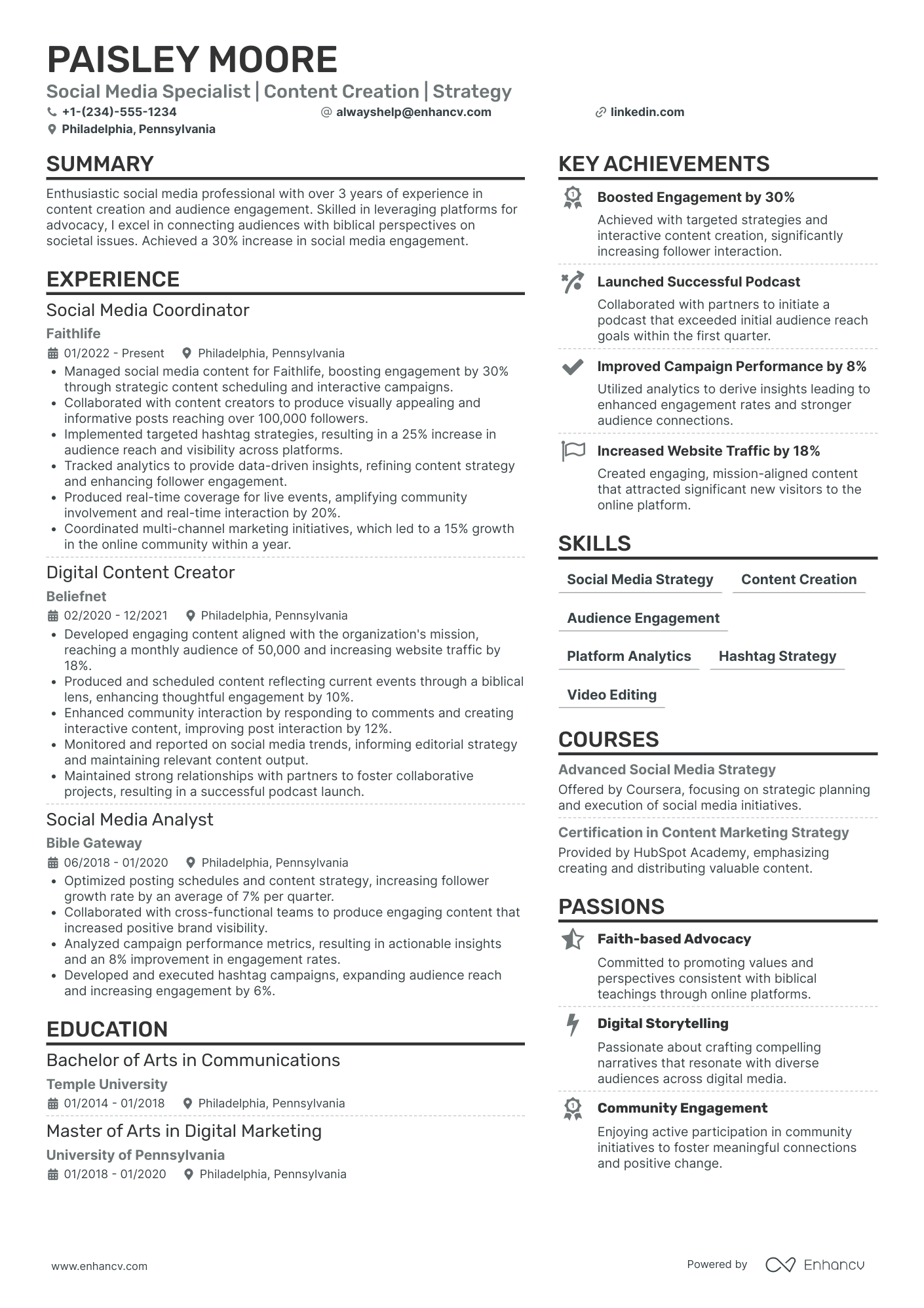Writing a social media manager resume is like learning a new social media platform. When new platforms emerge, it's up to social media managers to learn their intricacies to understand how content gets views and likes.
You can approach writing your social media manager Resume with the same mindset. To get views and responses from employers, you first need to understand what works and what doesn't.
Although managing social media emerged with the dawn of Myspace, it's still relatively new as a recognized profession. Therefore, established norms and industry standards for social media manager resumes remain somewhat limited.
This resume guide, including examples and pro tips, will address all of these and more to help you craft a resume that gets as much attention as your social media campaigns.
For additional social-media-related content, check out these related Enhancv resume guides:
Social Media Manager resume examples
By Experience
By Role
How to Format a Social Media Manager Resume
Navigating content saturation is a typical challenge in social media management. The sheer volume of content can make standing out and maintaining audience engagement challenging. This is similar to the challenge of creating resumes that get noticed in a crowd of applicants.
Your resume's formatting is an excellent opportunity to demonstrate your creativity and copywriting skills to make a positive first impression on potential employers.
Include these essential elements when formatting your social media manager resume:
- Creative Elements: Include creative elements, like colors, unique fonts, and decorative designs, to make your resume unique and memorable.
- Header Content: A prominent header featuring your name, desired job title, and contact information ensures they stand out to employers at a glance.
- Social Media Link: Provide links to your professional social media accounts, such as LinkedIn, to evidence your skills on these platforms.
- Ordering: List all examples in your resume sections in reverse chronological order to ensure your most recent and relevant appear first.
- Proofreading: Impeccable spelling, grammar, and punctuation skills are vital when managing social media content, and your resume is your first opportunity to demonstrate these skills.
Keep in mind the market you’re applying to – a Canadian resume, for instance, might have a unique layout.
PRO TIP
When formatting, consider your resume profile the same way you would a brand’s social media profile. Consistency in brand voice and messaging is essential on social media, just as cohesive formatting is on your resume.
Understanding web crawlers and keyword analytics is a critical skill for social media managers.
ATS (applicant tracking systems) perform a similar role on resumes. ATS analyzes text on resumes, looking for keywords or phrases corresponding to desired skills and qualifications for a specific job. Employers use these systems to quickly sort and prioritize resumes to consider the most qualified candidates.
Review these best practices for ATS-optimized formatting on your social media manager resume:
- Fonts: Select ATS-friendly fonts matching the overall style of your resume. Some ATS-friendly fonts are Calibri, Arial, and Times New Roman. However, these commonly used fonts can be dull or generic. For more creative font options, try Rubik, Lato, Montserrat, Raleway, Exo 2, and Volkhov, which are all available on the Enhancv Resume Builder.
- Document Type: Doc or PDF files are typical for resumes and most easily analyzed by ATS.
- Creative Elements in Text: Avoid using nonessential stylistic features within text. Elements such as emojis and non-standard date formats can impede ATS’ ability to recognize information in these sections.
- Headings and Subheadings: Ensure resume sections are organized and include simple, precise headings. Standard section titles ensure ATS accurately recognizes and extracts information from these sections.
Is your resume good enough?
Drop your resume here or choose a file. PDF & DOCX only. Max 2MB file size.
To improve the organization and ATS optimization of your social media manager resume, include the following top-recommended sections:
The top sections on a social media manager resume:
- Professional Summary: Briefly summarizing your Social Media Management background and providing a broad overview of your skills and expertise.
- Core Skills: Highlighting keyword strengths offers hiring managers a quick overview of specific competencies in social media management aligned with the job requirements.
- Career History: Offering vital information about related roles and shedding light on practical experiences gained and accomplishments made in these positions.
- Social Media Project Portfolio: Showcasing successful campaigns and social media strategies implemented as tangible evidence of your capabilities.
- Certifications/Training: Indicating you possess the current knowledge and skills in social media best practices and evidencing your commitment to continuous growth and learning.
The ever-changing nature of social media management means candidates have unique backgrounds and qualifications. However, these highly sought-after qualifications should be included on your resume whenever possible:
What recruiters want to see on your resume:
- Proven Experience in Social Media Management: Past successful experience is a critical factor that indicates the potential for success in similar roles.
- Knowledge of Content Management Systems: Understanding and familiarity with these systems show that the candidate can create, manage, and optimize the company's social media platforms.
- Strong Creative Skills: Creative skills are necessary for developing engaging and innovative content, ensuring the audience remains engaged and business objectives are met.
- Understanding of SEO and Analytics: These skills show that the candidate can analyze the performance of social media campaigns and make data-driven decisions.
- Exceptional Copywriting Skills: Clear and compelling writing is essential when creating social media posts that engage and inspire the audience.
How to Write Your Social Media Manager Resume Experience
Resumes are like Twitter. An applicant must make a significant impact using as few characters as possible. It's essential to keep this concept in mind when writing your resume's experience section.
A common mistake in the experience section is overlooking opportunities to highlight skills and accomplishments rather than simply naming tasks handled. For example, a social media manager may demonstrate efficiency using social media management tools or show off outcomes resulting from a successful campaign strategy.
Check out how this experience example is improved by concentrating on skill development and achievements over duties performed.
- •Created an Instagram marketing campaign to increase sales.
- •Oversaw Facebook content strategy to increase in engagement.
- •Utilized A/B testing methodology across social media ad campaigns
- •Managed customer service responses on social media platforms according to customer satisfaction standards.
This example lets the employer know the applicant's experience handling particular responsibilities. However, it does little to demonstrate how successful they were or how active a role they played in achieving objectives.
- •Conceptualized and executed an Instagram marketing campaign that directly contributed to $100,000 in sales within two months.
- •Created a targeted content strategy resulting in a 50% increase in engagement on the company's Facebook page within three months.
- •Introduced A/B testing methodology for social media ad campaigns, leading to a 20% improvement in conversion rates and a more efficient use of advertising budget.
- •Implemented a streamlined customer service process, reducing response time on social media platforms by 40% and enhancing overall customer satisfaction.
The revised example provides excellent quantitative evidence of their success by including numbers and statistics. Additionally, they use action verbs, like “created” and “implemented,” to share achievements resulting from their initiatives. The result is a compelling description utilizing more keyword phrases.
Another consideration to make the most of the limited space in your experience section is creating a targeted experience section. Not every work experience highlights skills relevant to every available position. Therefore, selecting examples highlighting skills aligned with particular employment opportunities is best.
PRO TIP
To quickly and easily create a targeted social media manager resume for each employment opportunity, follow these steps:
- Create a resume template including a complete list of your experiences, certifications, education, and skills.
- Make a copy of the template for each new application.
- Review the job description for each new job you apply to, paying close attention to ideal candidate descriptions.
- In the new copy, delete all examples not aligned with the job description.
- Edit remaining examples to ensure they include keywords from the job description for increased ATS optimization.
How to quantify the impact on your resume
When demonstrating your accomplishments, numbers, and statistics speak louder than words.
Thanks to the critical role of analytics in social media management, demonstrating efficiency and impact with data should be a breeze.
Here are a few outstanding ways to incorporate quantitative evidence in your experience descriptions:
- The number of social media followers you've garnered for brands demonstrates your ability to grow an audience.
- How many content pieces you've produced weekly or monthly illustrates your diligence and efficiency in quickly producing large amounts of content.
- A percentage increase in audience engagement highlights your capacity to cultivate meaningful interactions.
- The number of platforms managed simultaneously exhibits your ability to multitask and handle numerous platforms.
- Click-through rates on posts and campaigns indicate your ability to create content that directs traffic.
PRO TIP
When giving statistics, name the social media management and analytics tools used to acquire the data, such as Hootsuite, Sprout Social, and Google Analytics, to demonstrate your capabilities using them.
How do I write a social media manager resume with no experience
Even without formal employment as a social media manager, most applicants have extensive social media experience. The key to writing your experience section without employment experience is to focus on alternative experiences, such as managing your social media accounts or working on projects that highlight the same skills and achievements.
Follow these steps to convey your skills and qualifications without prior social media management experience:
- Compile a list of keywords from the job description.
- Brainstorm previous social media experiences showcasing the same keyword skills and knowledge from your list. These could be experiences from school, an internship, working with a non-profit, helping a friend or family member, freelancing, or working on a personal passion project.
- Whenever possible, provide samples of your work. (See the portfolio section for more info on showcasing your work)
- To add credibility, include tangible evidence of transferable skills, such as relevant education and certifications.
- Include quantifiable data, if available, to demonstrate your efficacy.
- Avoid including irrelevant work experiences or outdated experiences.
- Always list experiences in reverse chronological order to ensure your most recent and relevant examples appear first.
PRO TIP
Without employment experience, your cover letter is an excellent opportunity to give further detail about past jobs and describe how skills and knowledge acquired outside the field are transferable to the open position.
How to List Your Hard Skills and Soft Skills on Your Resume
The skills section of your social media manager resume serves as a quick reference indicating your suitability for a position. It should demonstrate your hard skills, such as proficiency in many different social media platforms and tools, as well as soft skills that will help you succeed.
Hard skills
Hard skills are skills necessary to perform a particular job. Typically, they require study, training, and practice. In social media, these skills are often technical expertise with platforms and tools and strategic marketing skills.
When considering which skills to include on your resume, consult this list of the top hard skills for social media managers:
Best hard skills for your social media manager resume
- Social Media Platform Management
- Content Creation
- SEO Implementation
- Social Media Advertising and Marketing
- Graphic Design
- Video Editing
- Copywriting
- Digital Marketing
- HTML/CSS basics
- Audience Growth Techniques
- Understanding of CRM
- Knowledge of CMS
- Data Analysis
- Brand Development
- Email Marketing
- Project Management
- Web Analytics Tools: Google Analytics, Facebook Insights, Hootsuite, Buffer, Sprout Social, etc.
- Marketing Automation Software
- Pay Per Click (PPC) Campaigns
- Negative Feedback and Crisis Management skills
Soft skills
Soft skills are sometimes overlooked on social media manager resumes. However, they provide an incredible opportunity to distinguish yourself from other candidates.
Soft skills are the intrinsic, personal skills that demonstrate what makes you uniquely qualified to succeed in a role. For example, adaptability is a vital soft skill for social media managers since they must cope with frequent algorithm updates on platforms that affect content visibility and require updated campaign strategies.
These are some of the top soft skills employers look for in social media managers:
Best soft skills for your social media manager resume
- Communication
- Creativity
- Adaptability
- Organizational Skills
- Decision Making
- Empathy
- Customer Service
- Problem-Solving
- Multitasking
- Collaboration
- Time Management
- Analytical Thinking
- Dependability
- Critical Thinking
- Flexibility
- Detail Oriented
- Initiative
- Persuasion
- Motivation
- Leadership
Follow these steps to write a superb skills section:
- Format your skills section as a simple list without elaboration or examples.
- Differentiate between hard and soft skills by listing them in separate subsections.
- Target your skills section using keyword skills from the job description.
- Write keyword skills precisely as they appear in the job description to enhance ATS analysis.
- Never lie about or exaggerate your skills on your resume.
- Keep your experience and skills sections consistent. List the skills mentioned in the experience section on your skills list and demonstrate how you’ve developed skills in your experience descriptions.
How to List Your Certifications and Education on Your Resume
The digital landscape, including social media, changes rapidly with new platforms, algorithms, rules, and features. Sharing ongoing learning and up-to-date certifications is an incredible way to verify hard skills and corroborate soft skills, like dedication to continuous improvement.
To share relevant certifications on your social media manager resume, follow these steps:
- Include the name of the certification, the certifying institution, and the year obtained.
- Limit certifications to current, unexpired credentials. For example, if you completed a Twitter (X) certification before 2022, it would no longer be relevant due to the vast changes the platform has undergone since changing ownership.
- Limit your certifications to only those specifically named or directly related to the required skills mentioned in a job description.
For some of the most sought-after certifications for social media managers, consult the list below.
Best certifications for your social media manager resume
- HubSpot Academy Social Media Marketing Course
- Hootsuite Academy Social Media Marketing Certification
- Cornell University’s Social Media Marketing CertificateLinkedIn Learning: Social Media Marketer Learning Path
- Facebook Blueprint CertificationGoogle Digital Garage (Fundamentals of digital marketing)
- Pinterest Academy
- LinkedIn Learning (Various Courses)
- Social Media Marketing Professional Certificate by Coursera (offered by Meta)
- Social Media Strategist Certification by the National Institute for Social Media
There's no established degree requirement for social media managers, and many social media managers develop their skills through self-teaching or hands-on experience. However, according to Socialinsider, 50% of social media managers hold a bachelor's degree. The most common areas of study for these degrees are marketing, journalism, communications, creative writing, and graphic design.
Sharing your relevant education demonstrates your foundational knowledge and specialized skills that employers value. Additionally, it's vital to include your education when a degree requirement is stated in a job post.
To include an education section on your social media manager resume, follow these steps:
- For each degree, include the name of the university, its location, the dates attended, and the title of your degree.
- Including your GPA is optional unless the job description specifies a minimum GPA requirement.
- Only include your major and minor if relevant to the open position.
Here's an example of how your education section should appear on your resume:
How to Write Your Social Media Manager Resume Summary Or Objective
social media managers often have diverse experiences handling a myriad of tasks, working on multiple platforms, and collaborating with diverse people and brands. For this reason, it's essential to form a narrative illustrating how your career progression makes you uniquely qualified for a job.
A summary or objective section, sometimes called "Resume Profiles" or "Personal Statements," allows you to briefly summarize the facts and data on your resume to explain how your background and goals are suitable for a particular job.
The difference between a summary and an objective is that a summary describes how your past employment experiences align with the opportunity. In contrast, an objective demonstrates how your future career goals correspond.
A summary is preferable if you have extensive social media management experience or closely related experience, such as working with a similar industry or brand. To highlight how your past success indicates your potential to be successful in the new job.
To write a resume summary, follow these best practices:
- Highlight your most relevant skills or experiences that directly overlap with the job description.
- Write an impactful description using keywords directly from the job description.
- Be brief. A summary should only be 3-5 sentences.
When writing a summary section with well-aligned industry experience, ensure your summary explicitly presents your related expertise and skills. A common mistake is writing a summary that is too general when a targeted summary would be more effective.
Check out how targeting this example summary to the hospitality field makes it more compelling.
This summary is well formatted and highlights excellent skills for a social media manager. However, it is too broad and could be applied to nearly any social media manager position, resulting in missed opportunities to incorporate industry-specific keywords and stand out to employers.
This summary improves upon the previous example by sharing specifics of their work in the hospitality industry. It incorporates targeted keywords and details significant hospitality-specific achievements such as “boosting bookings” and “enhancing guest experiences.” The resulting summary will stand out to any hospitality company seeking a social media manager.
Optimize your resume summary and objective for ATS
Drop your resume here or choose a file.
PDF & DOCX only. Max 2MB file size.
Additional Sections for a Social Media Manager Resume
In addition to the top-resume sections above, including additional resume sections is an excellent strategy to present additional qualifications or accomplishments and stand out from other applicants.
These optional sections are highly relevant for social media manager resumes:
- Social Media Platform Proficiency: Specifying your level of proficiency with the various social media platforms helps establish your diverse skillset and level of expertise with each.
- Languages: social media managers often must cater to diverse audiences, and understanding the preferences, behaviors, and expectations of different demographics. Therefore, highlighting language skills and fluency on your resume is a significant asset.
- My Time: This section breaks down a typical work day or week, demonstrating your time management and task prioritization skills. For an example of this section, see the resume example above.
- References: While not always necessary on a resume, references from former clients or employers can be impactful, especially for those whose experience is primarily in freelancing. These references should substantiate your stated skills and achievements.
Individualizing your resume with tailored sections will ensure it reflects your top qualifications and provide additional opportunities to include targeted keywords. Should you include sections other than those above, be sure they use catchy, ATS-friendly headings.
How to include a portfolio on your social media manager resume
Proving ROI and engagement on social media campaigns can be especially hard without visuals. That's one reason a portfolio is a vital tool for social media managers.
A portfolio allows you to showcase your related skills, projects, and accomplishments and provide potential employers with tangible demonstrations of your capabilities and work quality.
Here are a few key elements to consider when creating a portfolio section:
- Your portfolio should contain examples of successful social media campaigns, content creation, and analytics reports that demonstrate your skills.
- Your portfolio can also contain achievements and awards to demonstrate outstanding abilities and accomplishments.
- When possible, include examples of real-time management skills in responding to online complaints or trolling since a social media manager's role may involve handling crises.
- Format your portfolio section with the heading "Portfolio," a short description, and a link to your online portfolio.
This example illustrates how your portfolio section should appear on your resume:
An additional benefit of a portfolio is that it provides an additional opportunity to include information that doesn't fit within the limited space of your resume. However, not all employers will view your portfolio, and ATS will not analyze your portfolio for keywords. Therefore, your relevant skills and qualifications must be included in your resume.
Key Takeaways
Creating engaging content is critical in social media management. These key takeaways will help you approach your social media manager resume with the same mindset applied to creating social media campaigns to garner engagement from potential employers:
- Like social media content, you must target your resume's skills and experiences to your audience by including only relevant examples for a particular position.
- Your resume's formatting demonstrates essential skills such as creativity, attention to detail, and copywriting abilities.
- ATS works in much the same way web crawlers analyze online content. Optimization requires close attention to relevant keywords and formatting to ensure your resume reaches employers.
- Your experience descriptions should include relevant quantitative evidence of your success in previous social media campaigns.
- Include both hard and transferable soft skills, using precise wording for enhanced ATS optimization.
- List relevant education and certifications to demonstrate your knowledge and dedication to staying current with changes in social media.
- Include a portfolio section to showcase prior successful campaigns.
